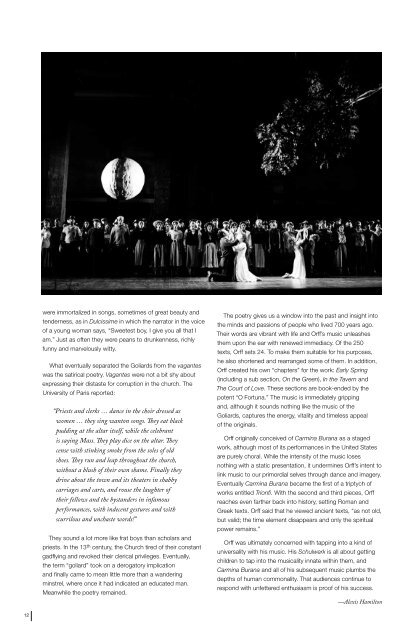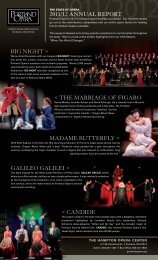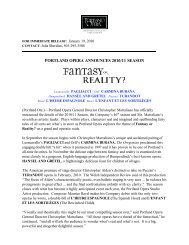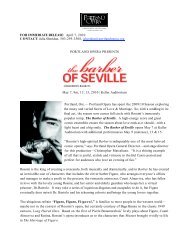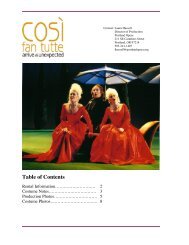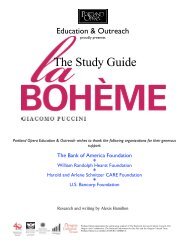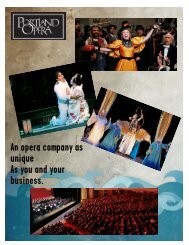christopher mattaliano - Portland Opera
christopher mattaliano - Portland Opera
christopher mattaliano - Portland Opera
You also want an ePaper? Increase the reach of your titles
YUMPU automatically turns print PDFs into web optimized ePapers that Google loves.
were immortalized in songs, sometimes of great beauty and<br />
tenderness, as in Dulcissime in which the narrator in the voice<br />
of a young woman says, “Sweetest boy, I give you all that I<br />
am.” Just as often they were peans to drunkenness, richly<br />
funny and marvelously witty.<br />
What eventually separated the Goliards from the vagantes<br />
was the satirical poetry. Vagantes were not a bit shy about<br />
expressing their distaste for corruption in the church. The<br />
University of Paris reported:<br />
“Priests and clerks … dance in the choir dressed as<br />
women … they sing wanton songs. They eat black<br />
pudding at the altar itself, while the celebrant<br />
is saying Mass. They play dice on the altar. They<br />
cense with stinking smoke from the soles of old<br />
shoes. They run and leap throughout the church,<br />
without a blush of their own shame. Finally they<br />
drive about the town and its theaters in shabby<br />
carriages and carts, and rouse the laughter of<br />
their fellows and the bystanders in infamous<br />
performances, with indecent gestures and with<br />
scurrilous and unchaste words!”<br />
They sound a lot more like frat boys than scholars and<br />
priests. In the 13 th century, the Church tired of their constant<br />
gadflying and revoked their clerical privileges. Eventually,<br />
the term “goliard” took on a derogatory implication<br />
and finally came to mean little more than a wandering<br />
minstrel, where once it had indicated an educated man.<br />
Meanwhile the poetry remained.<br />
The poetry gives us a window into the past and insight into<br />
the minds and passions of people who lived 700 years ago.<br />
Their words are vibrant with life and Orff’s music unleashes<br />
them upon the ear with renewed immediacy. Of the 250<br />
texts, Orff sets 24. To make them suitable for his purposes,<br />
he also shortened and rearranged some of them. In addition,<br />
Orff created his own “chapters” for the work: Early Spring<br />
(including a sub section, On the Green), In the Tavern and<br />
The Court of Love. These sections are book-ended by the<br />
potent “O Fortuna.” The music is immediately gripping<br />
and, although it sounds nothing like the music of the<br />
Goliards, captures the energy, vitality and timeless appeal<br />
of the originals.<br />
Orff originally conceived of Carmina Burana as a staged<br />
work, although most of its performances in the United States<br />
are purely choral. While the intensity of the music loses<br />
nothing with a static presentation, it undermines Orff’s intent to<br />
link music to our primordial selves through dance and imagery.<br />
Eventually Carmina Burana became the first of a triptych of<br />
works entitled Trionfi. With the second and third pieces, Orff<br />
reaches even farther back into history, setting Roman and<br />
Greek texts. Orff said that he viewed ancient texts, “as not old,<br />
but valid; the time element disappears and only the spiritual<br />
power remains.”<br />
Orff was ultimately concerned with tapping into a kind of<br />
universality with his music. His Schulwerk is all about getting<br />
children to tap into the musicality innate within them, and<br />
Carmina Burana and all of his subsequent music plumbs the<br />
depths of human commonality. That audiences continue to<br />
respond with unfettered enthusiasm is proof of his success.<br />
—Alexis Hamilton<br />
12


